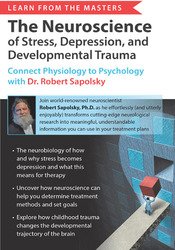

In this captivating recording, you’ll have the rare opportunity to learn from Dr. Robert Sapolsky, one of the world’s leading researchers on the physiology and psychology of stress.
Dubbed the “world’s funniest neuroscientist” (Salon.com), Dr. Sapolsky will guide you through physiological explanations for stress and depression, interconnect the fields of psychology and neurobiology, and strengthen the case for brain-based therapeutic treatments.
Two hours of an enlightening and entertaining lecture from Dr. Sapolsky are followed by a unique one-hour interview with clinical psychologist, international speaker, and author Dr. Jennifer Sweeton. In what is sure to be a lively, informative, and thought-provoking discussion, doctors Sapolsky and Sweeton will cover a variety of topics about stress, depression, and trauma, and tie it all back to the strategies and techniques that you can use in the office with your clients each day.
Key Benefits of Watching:
This online program is worth 3.0 hours CPD.
| File type | File name | Number of pages | |
|---|---|---|---|
| Manual (2.54 MB) | 33 Pages | Available after Purchase |

Dr. Robert Sapolsky, is a MacArthur “Genius” Fellow, a professor of biology and neurology at Stanford University, and a research associate with the Institute of Primate Research at the National Museum of Kenya. In 2008, National Geographic & PBS aired an hour-long special on stress featuring Dr. Sapolsky and his research on the subject. In addition to A Primate’s Memoir, which won the 2001 Bay Area Book Reviewers Award in nonfiction, he has written three other books, including The Trouble with Testosterone, Why Zebras Don’t Get Ulcers, and Monkeyluv and Other Essays on our Lives as Animals. Dr. Sapolsky was awarded Rockefeller University’s Lewis Thomas Prize for Writing about Science for 2008. His articles have appeared in publications such as Discover and The New Yorker, and he writes a biweekly column for the Wall Street Journal entitled “Mind & Matter.” His new book is Behave: The Biology of Humans at Our Best and Worst (Penguin Press May 2017).
As a boy in New York City, Dr. Sapolsky dreamed of living inside the African dioramas in the Museum of Natural History. By the age of 21, he made it to Africa and joined a troop of baboons. Although the life of a naturalist appealed to him because it was a chance to “get the hell out of Brooklyn,” he never really left people behind. In fact, he chose to live with the baboons because they are perfect for learning about stress and stress-related diseases in humans. Like their human cousins, baboons live in large, complex social groups and have lots of time, Dr. Sapolsky writes, “to devote to being rotten to each other.” Just like stressed-out people, stressed-out baboons have high blood pressure, high cholesterol, and hardened arteries. And just like people, baboons are good material for stories. His gift for storytelling led The New York Times to suggest, “If you crossed Jane Goodall with a borscht-belt comedian, she might have written a book like A Primate’s Memoir”, Dr. Sapolsky’s account of his early years as a field biologist.
The uniqueness of Dr. Sapolsky’s perspective on the human condition comes from the ease with which he combines his insights from the field with his findings as a neuroscientist. For more than 30 years he has divided his time between field work with baboons and highly technical neurological research in the laboratory. As a result, he can effortlessly move from a discussion of pecking orders in primate societies (human and baboon) to an explanation of how neurotransmitters work during stress – and get laughs doing it.
The humor and humanity he brings to sometimes-sobering subject matter make Dr. Sapolsky a fascinating speaker. He lectures widely on topics as diverse as stress and stress-related diseases, baboons, the biology of our individuality, the biology of religious belief, the biology of memory, schizophrenia, depression, aggression, and Alzheimer’s disease.
Speaker Disclosures:
Financial: Robert Sapolsky is a professor at Stanford University. He is a research associate at the National Museum of Kenya. Dr. Sapolsky receives a speaking honorarium from PESI, Inc.
Non-financial: Robert Sapolsky has no relevant non-financial relationship to disclose.
| 5 |
|
| 4 |
|
| 3 |
|
| 2 |
|
| 1 |
|
Satisfaction Guarantee
Your satisfaction is our goal and our guarantee. Concerns should be addressed to info@pesi.co.uk or call 01235847393.
Please wait ...